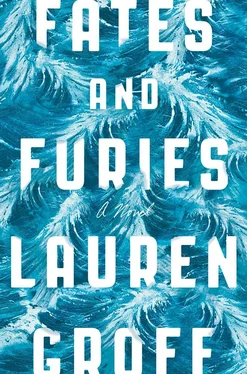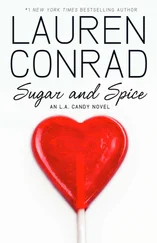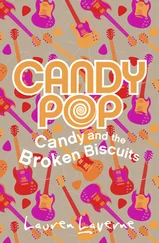Now Mathilde lifted a piece of salmon burger to Lotto’s lips, and though he didn’t want it, she was looking at him and the gold specks in her eyes glittered, and he took the bite off the fork. He kissed her on the freckled bridge of her nose.
“Disgusting,” Arnie called from his distant sheet. His arm was around some tattooed chick he was dating from his bar. “You’ve been married for a year. Honeymoon’s over.”
“Never,” Mathilde and Lotto said, at once. They did jinx pinkies, kissed again.
“What’s it like?” Natalie said quietly. “Marriage, I mean.”
Lotto said, “A never-ending banquet, and you eat and eat and never get full.”
Mathilde said, “Kipling called it a very long conversation.”
Lotto looked at his wife, touched her cheek. “Yes,” he said.
Chollie leaned toward Danica, who leaned away. He whispered, “You owe me a million bucks.”
“What?” she snapped. She was dying for a chicken leg, but had to plow through a heap of salad before she allowed herself anything fatty.
“Last year, at their housewarming,” Chollie said. “We bet a million bucks they’d be divorced by now. You lose.”
They looked at Lotto and Mathilde, so handsome, the still axis of the garden, of the spinning world. “I don’t know. How much of it’s an act?” Danica said. “There’s some sort of darkness there. Probably that he’s pretending to be faithful and she’s pretending not to care.”
“You’re mean,” Chollie said with admiration. “What’s your beef with Lotto? Were you one of his vanquished millions? They all still love him. I ran into that girl Bridget who was calling herself his girlfriend in college, and she burst into tears when she asked about him. He was the love of her life.”
Danica’s eyes and mouth tightened. Chollie laughed, revealing a roil of lasagna. “Naw, it’s the opposite,” he said. “He never went for you.”
“If you don’t shut up, you’re getting salad in the kisser,” she said.
They sat for a long moment, eating, pretending to eat. Then Danica said, “Fine. Double or nothing. But I get longer. Six years. Until 1998. And they’ll be divorced and you’ll pay me two million bucks and I’ll get an apartment in Paris. Enfin .”
Chollie blinked, bulged. “You’re assuming that I’ll be able to pay.”
“Of course you will. You’re the kind of slimy little man who makes a hundred million dollars by your thirties,” Danica said.
Chollie said, “That’s the nicest thing anyone ever said about me.”
When the shadows thickened just enough for the gesture to be hidden, Susannah gave Natalie a pinch on the rear. They laughed into their cups. It had been tacitly agreed upon: another night they would end up at Susannah’s. Only Natalie knew about Susannah’s new role as the bratty daughter of a soap opera villain; only Natalie knew about the new rising sea of feeling between them. “My career would die before it was born if everyone knew I was a big fat lesbo,” Susannah had said. Something sat wrong with Natalie, but she kept it in, let Susannah blaze inside her all day while she stood at her sad, gray desk trading commodities, her bank account spinning richer second by second.
Natalie was looking better, Lotto thought, watching her brush her hand over the last mint. She had bleached the moustache, lost weight, was dressing with flair. She had found the beauty he’d known was there all along. He smiled at her, and she blushed, smiled back.
Their eating slowed. The group fell silent. Caramel brownies went around. Some of the friends watched the creamy unfurl of a contrail in the darkling sky, and there was a poignancy in the way it disappeared, and this made most of them think about the dead black-haired girl, that they’d never again feel her arms around their necks in a hug. She had smelled like oranges.
“I found a boy who’d hung himself in prep school,” Lotto said suddenly. “Hanged himself.” They looked at his face with interest. He was pale, grim. They waited for the story because there was always a story with Lotto, but he didn’t say anything more. Mathilde took his hand.
“You never said,” she whispered.
“Tell you later,” he said. Poor pustuled Jelly Roll dangled ghostly in the garden for a breath; and Lotto passed his hand over his face, and the boy was gone.
Someone said, “Look! The moon!” and there it was, hove up like a ship in the navy edge of sky, and it filled them all with longing.
Rachel sat down beside her brother, leaned into his warmth. She was up for fall break, had pierced her ears all the way around, and wore her hair long in front, shaved in the rear. Radical for a ten-year-old, but she needed to do something , otherwise she looked a slight six with jittery hands, and from her studies of her cohort, she understood that it was better to be weird than twee. [Smart girl. Yes.] She had just gone in and put the envelope with her last year’s allowance in Mathilde’s underwear drawer, dabbling her hands among the silks; it had not escaped Rachel that her brother’s cabinets were bare, that Mathilde had called Sallie last month, that Sallie had sent cash. Now she was watching the window on the first floor where she had seen a fluttering edge of curtain, half a fist, one eye. Rachel pictured an interior with wallpapered ceilings. Cats with infirmities, Cyclops cats and cats with nubs for tails and gouty, swollen-pawed cats. Stink of joint rub. Bowl of minestrone heated in the microwave. Sad old woman inside. Muvva was heading fast toward that same future; the tiny pink beach house a tomb of figurines and chintz. Muvva loved the sound of the sea, she told Rachel, but Rachel had never even seen her go out into the sand. She just stayed in her little pink aquarium of a house like a sucker fish, gobblemouthing the glass. Poor Muvva.
I will never be old, Rachel promised herself. I will never be sad. I’d scarf a cyanide capsule first, kill myself like that friend of Lotto’s everyone is crying about. Life isn’t worth living unless you are young and surrounded by other young people in a beautiful cold garden perfumed by dirt and flowers and fallen leaves, gleaming in the string of lights, listening to the quiet city on the last fine night of the year.
Under the dying angel’s trumpet plant, the old lady’s tabby watched. Confusing, these people lounging around their food like enormous cats sated from the kill. She longed to pad in and investigate, but there were too many of them, and they were so sudden, so unpredictable. Just so: at once the people rose, shrieking, gathering things up in their arms, rushing about. The cat was startled that they were startled, because she had smelled the rain long before she heard it. A spoon fell from a bowl of tabbouleh and spun into the dirt and was abandoned, spattered by the mud kicked up by the first raindrops. The people were gone. A hand came out of a ground-level window and unplugged the tree lights. In the plunge of darkness, the yellow cord writhed into the window like a snake and the cat hungered to chase it, but it disappeared and the window closed. The cat dabbed her paw delicately at one fat drop on the edge of a leaf, then galloped across the yard and came inside.
—
THE DOOR TO THE APARTMENT OPENED; in leapt the goblin. It was nine at night, unseasonably cold. Behind the goblin came Miss Piggy, a skeleton, a ghost. Albert Einstein, moonwalking. Samuel came in wearing a lampshade for a hat, a cardboard box painted to resemble a bedside table, with a magazine and two condom wrappers glued on top.
Lotto in a toga, crowned by gilded bay leaves, put his beer down on Samuel’s tabletop and said, “Hello! You’re a nightstand. A one-night stand. Ha ha.”
A murdered prom queen froufroued by, muttering, “Wishful thinking.” Samuel said, “I think that was my ex-girlfriend,” grinned, went to the fridge for a beer.
Читать дальше












